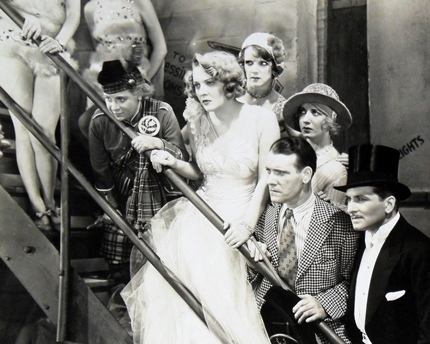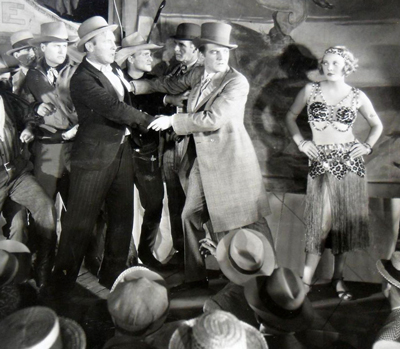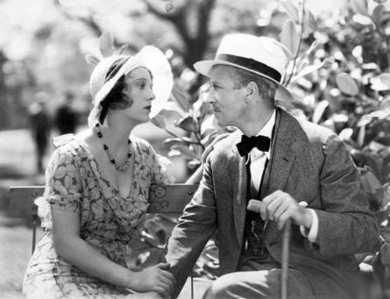
 |
|
|
|
The Warner Archive Collection's disc of William Wellman's weird, sordid Pre-code talkie Safe in Hell left me curious to see more movies by its leading lady, the very interesting Dorothy Mackaill. A highly successful silent screen star, Mackaill made a number of talkies before being rudely dropped when Warner Bros. cleaned house during its merger with First National Pictures. This is a shame, because Ms. Mackaill had a natural delivery that would have adapted well to Warners' house style. The radical Safe in Hell was an exception to Mackaill's career, as seen by her performances in The Office Wife and Party Husband, earlier films with mild Pre-code preoccupations about the perils of womanhood in a society flirting with open marriages and promiscuity. Throughout, we see Dorothy doing her best in what are really Victorian-themed stories flirting with Hot subject matter. The really progressive role is Joan Blondell's -- she gets the brassy dialogue and the provocative scenes in racy lingerie. This new Dorothy Mackaill Pre-code Double Feature steps back a year or two to see our star in a contrasting pair of productions. 1930's Bright Lights is a full-scale backstage Broadway musical, while The Reckless Hour forces Mackaill into a rather stiff morality play with few surprises. Both films express attitudes (and ideas of what might titillate an audience) in a culture decidedly different from our own. Want to understand the era that saw the Roaring Twenties merge into the anything-goes Depression years? Movies like this aren't a bad place to start. 
Bright Lights is a fairly obscure big-scale musical with multiple points of interest. It bears an alternate title, the head-scratcher Adventures in Africa. Some legal issue must have forced the change, as viewers would of course expect some kind of nature travelogue. Bright Lights is directed by the famous Michael Curtiz, already a Warners veteran but not yet the master of the talking picture -- in 1930 few directors were. Although the show looks glamorous in B&W, it was originally released in two-strip Technicolor. All color film materials have apparently been lost.
The story takes place on the Great White Way. The producers of the Broadway smash "Bright Lights" are sad to see their star Louanne (Dorothy Mackaill) leave the show. The whole town turns out for her farewell performance. Louanne has taken steps to hide her rather sordid past from her fiance Emerson Fairchild (Phillip Strange) and his snooty society mother. The show's male lead Wally Dean (Frank Fay) has never dared to declare himself, after years of devoted love; it is Wally that helped Louanne escape a low dive in South Africa, to come to New York initially as a "hula-hula" dancer. A secondary backstage romance involves performer Peggy North (beautiful Inez Courtney). Her disreputable boyfriend Connie Lamont (James Murray of King Vidor's The Crowd) has quit the rackets and gone into legitimate business. Drunken reporter A. Hamilton Fish (later Warners regular Frank McHugh) hangs around the theater to Bright Lights' Technicolor origins are pretty easy to spot -- we can see exaggerated rouge spots on most of the actor's faces, perhaps to heighten the 'greasepaint' look, or more likely because that's just how actors were made up then. Frank Fay looks as painted as the leading lady, but a lot less pretty. Dorothy Mackaill was a Ziegfeld star, and this show gives us a look at her stage style. She performs some spirited 'flapper' - type gestures, as well as stage strutting that almost reminds us of a cartoon character. Yet Dorothy remains an elegant and leggy beauty. I have no idea if the music was performed to playback or recorded live. Mackail sings "Song of the Congo" and "Cannibal Love", while Inez Courtney gets a rousing number called "Hey! Hey! He's Not So Dumb". The clownish Daphne Pollard puts across "I'm Sitting Pretty" quite well. Headliner Frank Fay sings in front of the chorus several times, during big dance numbers. These meat parades feature a mob of chorines all doing the same step, in ranks; or shuffling on and off stage fairly gracefully. Fay's number "Eyeful of Heaven" is a meet-the-babes song not unlike something from The Night they Raided Minsky's -- although this is definitely an upscale black-tie show. "Wall Street" features some odd designs that remind us that Anton Grot is the film's designer -- I can't say that any of the stage designs are particularly attractive, however. 
Louanne's interview with the press brings on a definite Don Lockwood situation. As the star reminices about her cultured upbringing, a series of flashbacks reveal her actual past in a hellhole South African dive. It's quite a fantasy, with Louette performing her "hula-hula" routine to an "exotic, tropical" audience of scurvy ne'er-do-wells. Actually, the show is not unlike what she does on the "fancy" Broadway stage. Out of this bizarre fantasy steps Parada, a slimy villain as typed as Bluto from the Popeye cartoons. Parada peeps at Louanne as she dresses and then attempts his rape. In the fight with Wally he's splashed with fluid from a lamp, which scars his face (?). Actor Noah Beery's brand of goonish villainy is really let loose in the jaw-dropping racist early talkie musical Golden Dawn. Besides the gorgeous Inez Courtney and Jean Laverty, Bright Lights gives us Frank McHugh in full force, playing drunk for the entire show. James Murray is quite charming as the rogue turned good-guy, and second romantic lead. Playing the heartbroken Wally, Frank Fay is so true-blue that we know his love will not go unrewarded by the final fade-out. The last act is a curious backstage murder investigation, conducted as the show continues and Louanne and her ritzy boyfriend are preparing to leave. As it turns out, everybody in the cast lies themselves pink providing Louanne with an alibi. In the context of this daffy musical, all of these narrative missteps come off as charming. Seen briefly is Louise Beavers as a maid (duh) and also a very young John Carradine, who we recognize more from his voice than his image in a crowd of reporters. 
The Reckless Hour is a creaky drama with not a single unique factor ... but brought nicely to life by some great cast members, namely Dorothy Mackaill, Joan Blondell and H.B. Warner. Its generic aspect makes it a showcase for society's attitudes about what "good girls" should or shouldn't do. It also shows that the culture had a keen awareness of class inequity, and an equal tolerance for fairy-tale endings to realistic stories. Are you unmarried and pregnant by an upper-class heel? A perfect marriage and a trip to Europe are surely soon to follow. Made just before Safe in Hell, The Reckless Hour concerns Margie Nichols (Mackaill), a lovely model who can't resist the advances of the charming and wealthy Allen Crane (Walter Byron). Margie lives with her family above the unprofitable bookstore run by her father Walter (H.B. Warner). Her flighty sister Myrtle is ready to date anybody, and is thrilled when Margie's new romance frees up her old steady, local lummox Harry (Joe Donohue). Margie's fate is the old story: Allan leads her on with promises of marriage and she goes too far. Months later and much wiser, Margie is barely willing to go out in public when one of Allan's friends calls. He's Eddie Adams (Conrad Nagel), a noted illustrator. Does Adams sincerely want to paint her on a strictly business basis, or is he hoping to score as had the liar Allan Crane? The Reckless Hour is Dorothy Mackaill's least distinctive role of the WAC releases to date, yet it is not without its own special pleasures. Practically a guide to 'dating do's and don'ts', it basically insists that beautiful girls from the wrong side of the social register would be wise to keep upscale lotharios at arm's length -- those b______ want only one thing. The artistic exception Eddie Adams is there to become the Prince Charming that Margie truly deserves. Frankly, the windup to this tale is not to be believed. Margie is about to sacrifice her honor to save her father's finances, which disappoints Eddie as he thought she was above such things and was just about to propose. Dramas like this require simple information either to be unreasonably withheld, or fortuitously revealed at just the exact right moment. Faster than a fairy godmother's magic wand, Margie goes from potential bought consort to happily ever after, reconciled with her wealthy new man and the father who never lost faith in her. 
Once again, simple plot mechanics conspire to give Joan Blondell the plum role. While everyone else is engaged in a serious (yes, stiff) drama, Joan's hot-to-trot young sister gets to rattle off the funny, provocative one-liners. We're supposed to believe that Blondell's Myrtle will be happy married to the goonish blowhard Harry. It's fun hearing arcane dialogue like "that's Jake with me!" spoken in a natural context. H.B. Warner gives Margie a solid sentimental backdrop -- who could purposely betray Mr. Gower from It's a Wonderful Life? Overweight actor Billy House is good as Dad's friend, who talks him into mortgaging his house and bookstore for a risky new business proposition. Talk about people that aren't household names, director John Francis Dillon is about as obscure as they some. Yet he directed 130 films, starting in 1914. They include notable titles like Flaming Youth (1923, it survives as a fragment), Dorothy Mackaill's own Man Crazy (1927) and Sally (1929) with Marilyn Miller. 
The Warner Archive Collection's Dorothy Mackaill Double Feature DVD-R of Bright Lights & The Reckless Hour is a good encoding of shows that have luckily not been lost. The Reckless Hour is in good shape all around. Bright Lights is also in acceptable shape. That replacement title is quite clean, and then cuts to a fairly blurry title sequence before the show stabilizes in much better shape. Because of the quality of the vintage audio, closer attention must be paid to the dialogue. Unlike films from just a year before, the Warners technicians apparently have the ability to mix soundtracks. Yet the dialogue has occasional difficulty staying clear of surface noise.
On a scale of Excellent, Good, Fair, and Poor,
Bright Lights & The Reckless Hour rates:
Reviews on the Savant main site have additional credits information and are often updated and annotated with reader input and graphics. Also, don't forget the 2011 Savant Wish List. T'was Ever Thus.
Review Staff | About DVD Talk | Newsletter Subscribe | Join DVD Talk Forum |
| ||||||||||||||||||